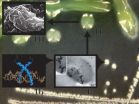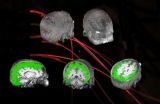(Press-News.org) Boston, MA — People who increased the amount of coffee they drank each day by more than one cup over a four-year period had a 11% lower risk for type 2 diabetes than those who made no changes to their coffee consumption, according to a new study led by Harvard School of Public Health (HSPH) researchers. In addition, the study found that those who decreased their coffee consumption by more than a cup per day increased their type 2 diabetes risk by 17%.
"Our findings confirm those of previous studies that showed that higher coffee consumption was associated with lower type 2 diabetes risk," said Shilpa Bhupathiraju, lead author and research fellow in the Department of Nutrition at HSPH. "Most importantly, they provide new evidence that changes in coffee consumption habit can affect type 2 diabetes risk in a relatively short period of time."
The study appears online Thursday, April 24, 2014 in Diabetologia (the journal of the European Association for the Study of Diabetes).
The researchers analyzed data on caffeinated and decaffeinated coffee, and caffeinated tea consumption from 48,464 women in the Brigham and Women's Hospital-based Nurses' Health Study (1986-2006), 47,510 women in Nurses' Health Study II (1991-2007), and 27,759 men in the Health Professionals Follow-up Study (1986-2006). Participants' diets were evaluated every four years with a questionnaire, and those who self-reported type 2 diabetes filled out additional questionnaires. A total of 7,269 cases of type 2 diabetes were documented.
Results showed that participants who increased their coffee consumption by more than one cup per day (median change=1.69 cups/day) over a four-year period had a 11% lower risk of type 2 diabetes in the subsequent four years compared to those who made no changes in consumption. (A cup of coffee was defined as eight ounces, black, or with a small amount of milk and/or sugar.) Those who lowered their daily coffee consumption by more than one cup (median change=2 cups/day) had a 17% higher risk for diabetes. Changes in decaffeinated coffee consumption and caffeinated tea consumption were not associated with changes in risk for type 2 diabetes.
"These findings further demonstrate that, for most people, coffee may have health benefits," said Frank Hu, senior author and professor of nutrition and epidemiology at HSPH. "But coffee is only one of many factors that influence diabetes risk. More importantly, individuals should watch their weight and be physically active."
INFORMATION:
This study was supported by research grants P01 CA87969, P01 CA055075, R01 HL034594 and HL60712 from the National Institutes of Health. The work of Shilpa Bhupathiraju was supported by a postdoctoral fellowship grant from the American Heart Association (13POST14370012).
Study author Rob van Dam (National University of Singapore and National University Health System, Singapore) received grant funding from Nestec Ltd for a randomized trial of the effects of coffee consumption on insulin sensitivity. Nestec Ltd is a broad food company that also sells coffee. This is grant funding specific for that project with a contractual agreement that ensures that the company cannot influence the design of the study or decision to publish the results. This funding does not in any way affect the current study. Other authors declare that there is no duality of interest associated with this manuscript.
"Changes in coffee intake and subsequent risk of type 2 diabetes: three large cohorts of US men and women," Shilpa N. Bhupathiraju, An Pan, JoAnn E. Manson, Walter C. Willett, Rob M. van Dam, Frank B. Hu, Diabetologia, online April 24, 2014, DOI 10.1007/s00125-014-3235-7
Visit the HSPH website for the latest news, press releases and multimedia offerings.
Harvard School of Public Health brings together dedicated experts from many disciplines to educate new generations of global health leaders and produce powerful ideas that improve the lives and health of people everywhere. As a community of leading scientists, educators, and students, we work together to take innovative ideas from the laboratory to people's lives—not only making scientific breakthroughs, but also working to change individual behaviors, public policies, and health care practices. Each year, more than 400 faculty members at HSPH teach 1,000-plus full-time students from around the world and train thousands more through online and executive education courses. Founded in 1913 as the Harvard-MIT School of Health Officers, the School is recognized as America's oldest professional training program in public health.
HSPH on Twitter: http://twitter.com/HarvardHSPH
HSPH on Facebook: http://www.facebook.com/harvardpublichealth
HSPH on You Tube: http://www.youtube.com/user/HarvardPublicHealth
HSPH home page: http://www.hsph.harvard.edu
Increasing daily coffee consumption may reduce type 2 diabetes risk
2014-04-25
ELSE PRESS RELEASES FROM THIS DATE:
Researchers trace HIV adaptation to its human host
2014-04-25
"Much research has focused on how HIV adapts to antiviral drugs – we wanted to investigate how HIV adapts to us, its human host, over time," says lead author Zabrina Brumme from Simon Fraser University.
In a study published in PLOS Genetics, which traces the evolution of HIV in North America, the Brumme lab and colleagues at the BC Centre for Excellence in HIV/AIDS, Harvard University, the New York Blood Center, and The San Francisco Department of Public Health found evidence that the virus is slowly adapting over time to its human hosts. However, this change is so gradual ...
Low-dose natural antimicrobial exacerbates chronic lung infection in cystic fibrosis
2014-04-25
Respiratory failure caused by chronic lung infection with Pseudomonas aeruginosa bacteria is a common cause of death in patients with cystic fibrosis (CF), a genetic disease that is common in individuals of European descent. A study published on April 24th in PLOS Pathogens demonstrates that an antimicrobial peptide produced by human immune cells can promote mutations in the bacterium that make it more lethal.
Daniel Wozniak, from The Ohio State University Wexner Medical Center, USA, and colleagues studied a process called "mucoid conversion", which involves mutations ...
Many patients who could benefit from home dialysis are receiving care in dialysis centers
2014-04-25
Washington, DC (April 24, 2014) — Many kidney failure patients in Australia who could benefit from undergoing dialysis at home are being treated in hospitals and dialysis units, according to a study appearing in an upcoming issue of the Clinical Journal of the American Society of Nephrology (CJASN). This is creating significant costs for healthcare providers and causing unnecessary disruptions to patients' lives.
Home dialysis is more convenient for patients and can provide similar or better care than hemodialysis, which must be done in a clinic. Blair Grace, PhD (Australia ...
Muscle mass linked with physical function and quality of life in dialysis patients
2014-04-25
Washington, DC (April 24, 2014) — Dialysis patients with more muscle mass had better scores on a 6-minute walking test as well as better scores on physical and mental health questionnaires in a study appearing in an upcoming issue of the Clinical Journal of the American Society of Nephrology (CJASN). The findings suggest that physical activity that builds muscle mass may help improve the health and quality of life of dialysis patients.
Physical functional ability is often significantly impaired in patients on maintenance hemodialysis. Srinivasan Beddhu, MD (University ...
Astronomical forensics uncover planetary disks in NASA's Hubble archive
2014-04-25
Astronomers using NASA's Hubble Space Telescope have applied a new image processing technique to obtain near-infrared scattered light photos of five disks observed around young stars in the Mikulski Archive for Space Telescopes database. These disks are telltale evidence for newly formed planets.
If astronomers initially miss something in their review of data, they can make new discoveries by revisiting earlier data with new image processing techniques, thanks to the wealth of information stored in the Hubble data archive. This is what Rémi Soummer, of the Space Telescope ...
Study suggests targeting B cells may help with MS
2014-04-24
PHILADELPHIA – A new study suggests that targeting B cells, which are a type of white blood cell in the immune system, may be associated with reduced disease activity for people with multiple sclerosis (MS). The study is released today and will be presented at the American Academy of Neurology's 66th Annual Meeting in Philadelphia, April 26 to May 3, 2014.
For the study, 231 people with relapsing-remitting MS received either a placebo or one of several low dosages of the drug ofatumumab, which is an anti-B cell antibody, for 24 weeks, with the first 12 weeks making up ...
New guidelines aim to improve care for babies with heart problems in the womb
2014-04-24
Fetal heart experts working with the American Heart Association have developed guidelines to help healthcare providers care for unborn babies with heart problems, as well as their families.
The statement, Diagnosis and Treatment of Fetal Cardiac Disease, is published in the American Heart Association journal, Circulation.
"Congenital heart disease is the most common birth defect that can result in either death or significant health problems in newborn babies," said Mary T. Donofrio, M.D., lead writer of the statement, and director of the Fetal Heart Program and Critical ...
Genetic alterations in shared biological pathways as major risk factor for ASD
2014-04-24
A substantial proportion of risk for developing autism spectrum disorders (ASD), resides in genes that are part of specific, interconnected biological pathways, according to researchers from the Icahn School of Medicine at Mount Sinai, who conducted a broad study of almost 2,500 families in the United States and throughout the world. The study, titled "Convergence of Genes and Cellular Pathways Dysregulated in Autism Spectrum Disorders," was first published online in the American Journal of Human Genetics on April 24.
ASD affects about one percent of the population ...
Controlling brain waves to improve vision
2014-04-24
Have you ever accidently missed a red light or a stop sign? Or have you heard someone mention a visible event that you passed by but totally missed seeing?
"When we have different things competing for our attention, we can only be aware of so much of what we see," said Kyle Mathewson, Beckman Institute Postdoctoral Fellow at the University of Illinois. "For example, when you're driving, you might really be concentrating on obeying traffic signals."
But say there's an unexpected event: an emergency vehicle, a pedestrian, or an animal running into the road—will you actually ...
Computer program could help solve arson cases
2014-04-24
Sifting through the chemical clues left behind by arson is delicate, time-consuming work, but University of Alberta researchers teaming with RCMP scientists in Canada, have found a way to speed the process.
A computer program developed by University of Alberta chemistry professor James Harynuk, his team of graduate and undergraduate researchers and the Royal Canadian Mounted Police National Forensic Laboratory Services, can cut the need for extra levels of human analysis, reducing the waiting time to find out the cause of a deliberately set fire.
That means quicker ...


